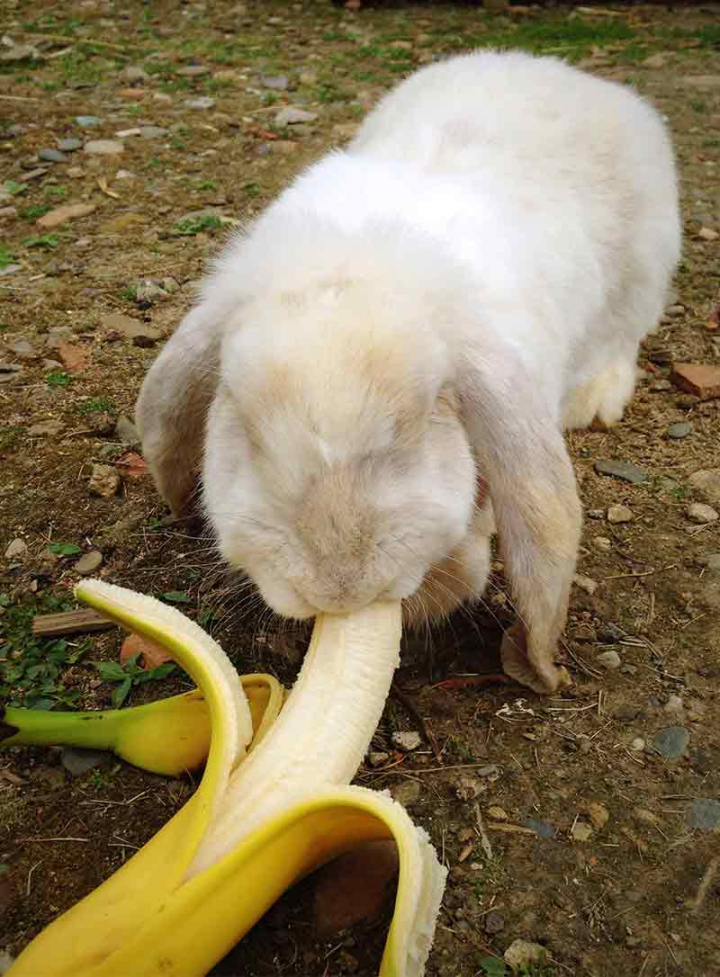Can Rabbits Eat Bananas?
Rabbits are known for their love of fresh fruits and vegetables, but not all fruits are safe for them to consume. One common question that rabbit owners often ask is whether rabbits can eat bananas. In this article, we will explore whether bananas are suitable food for rabbits, and if so, how much they can have and how often.

Can Rabbits Eat Bananas?
Yes, rabbits can eat bananas, but they should only be given as an occasional treat rather than a regular part of their diet. Bananas are high in sugar and starch, which can lead to digestive issues and obesity if consumed in large quantities. Therefore, it is important to feed bananas to rabbits in moderation.
How Much Banana Can Rabbits Have?
Rabbits have sensitive digestive systems, so it is best to introduce new foods gradually. When it comes to bananas, a small slice or a few small pieces once or twice a week is sufficient. This amount ensures that rabbits receive the nutritional benefits of bananas without overloading their system with excess sugar and starch.
How Often Can Rabbits Eat Bananas?
Rabbits should only have bananas occasionally. While rabbits enjoy the taste of bananas, they are not a necessary part of their diet. It is important to remember that rabbits need a balanced diet that consists primarily of hay, fresh vegetables, and a small amount of pellets. Bananas should be seen as a special treat rather than a regular food item.
Benefits of Feeding Bananas to Rabbits
While it is important to feed bananas to rabbits in moderation, there are some nutritional benefits associated with this fruit:
- Vitamins and Minerals: Bananas contain essential vitamins such as vitamin C and vitamin B6, as well as minerals like potassium. These nutrients can support the overall health and wellbeing of rabbits when consumed in moderation.
- Hydration: Bananas have a high water content, which can help keep rabbits hydrated. This is particularly beneficial during warmer months or in cases where rabbits may be experiencing mild dehydration.
- Treat Option: Many rabbits enjoy the taste of bananas, and offering them as an occasional treat can provide mental stimulation and enrichment for these curious creatures.
Frequently Asked Questions (FAQs)
1. Can rabbits eat banana peels?
No, rabbits should not eat banana peels. Banana peels are difficult for rabbits to digest and may cause gastrointestinal issues. It is best to remove the peel before feeding a small slice of banana to your pet rabbit.
2. Are bananas safe for baby rabbits?
Yes, bananas can be given to baby rabbits, but the same guidelines regarding moderation should be followed. Baby rabbits have more sensitive digestive systems, so it is even more important to introduce new foods slowly and carefully.
3. Can rabbits with health issues eat bananas?
Rabbits with certain health issues, such as diabetes or a history of gastrointestinal problems, should avoid bananas altogether. The high sugar content of bananas can exacerbate these conditions. It is always best to consult with a veterinarian before introducing any new food into a rabbit’s diet.
4. How do I introduce bananas to my rabbit?
When introducing bananas to your rabbit, start with a small slice or a few small pieces. Observe your rabbit’s reaction and monitor their digestion. If there are no adverse effects, you can gradually increase the amount over time. However, always remember that moderation is key.
While rabbits can eat bananas, it is important to remember that they should only have them as an occasional treat. Moderation is key to prevent digestive issues and maintain a healthy diet for rabbits. Always consult with a veterinarian if you have any concerns or questions about feeding bananas or any other new foods to your pet rabbit.
Related Articles…
Copyright Notice:
All images on this website are obtained from the internet and remain copyrighted to their original owners. If you hold copyright to any image and want it taken down, please reach us.